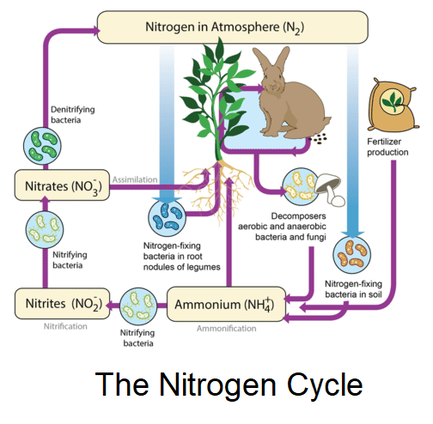How can organic fertilizer help in the nitrogen cycle?

Organic fertilizers play a crucial role in the nitrogen cycle by providing a sustainable and environmentally friendly source of nitrogen for plants.
Here's how organic fertilizers contribute to the nitrogen cycle:
Here's how organic fertilizers contribute to the nitrogen cycle:
- Nitrogen Fixation: Some organic fertilizers, such as legume-based fertilizers or those derived from nitrogen-fixing plants like clover, contribute to nitrogen fixation. Nitrogen-fixing plants have a symbiotic relationship with certain bacteria that reside in their root nodules. These bacteria convert atmospheric nitrogen into a form that plants can use, effectively "fixing" nitrogen from the air and making it available in the soil. When organic fertilizers derived from nitrogen-fixing plants are applied to the soil, they introduce these beneficial bacteria, which help convert atmospheric nitrogen into plant-available forms.
- Organic Matter Decomposition: Organic fertilizers contain organic materials such as compost, manure, or plant residues. When these materials decompose, nitrogen is released into the soil. During decomposition, microorganisms break down the organic matter, converting nitrogen-containing compounds into ammonium (NH4+), a form of nitrogen that plants can utilize. This process, known as mineralization, releases nitrogen from the organic fertilizer, making it available for plant uptake.
- Nutrient Cycling: Organic fertilizers contribute to the cycling of nitrogen in the soil. As plants take up nitrogen from the soil, they use it for their growth and development. When organic fertilizers are applied, they replenish the soil with nitrogen, ensuring a continuous supply for plant uptake. Organic matter in the fertilizers also improves soil structure and enhances microbial activity. Beneficial soil microorganisms break down organic matter and convert nitrogen from organic forms into inorganic forms that plants can utilize, completing the nutrient cycling process.
- Reduced Leaching and Environmental Impact: One significant advantage of organic fertilizers in the nitrogen cycle is their reduced potential for leaching and environmental pollution. Synthetic fertilizers, which often contain highly soluble forms of nitrogen, can be prone to leaching into groundwater or runoff into water bodies, causing water pollution. Organic fertilizers release nitrogen more slowly, reducing the risk of excess nitrogen leaching away. This slow-release characteristic allows plants to take up nitrogen as needed, minimizing waste and environmental impact.
- Soil Health and Microbial Activity: Organic fertilizers support the activity of beneficial soil microorganisms involved in the nitrogen cycle. These microorganisms break down organic matter, convert nitrogen between different forms, and contribute to the overall soil health. By promoting a diverse and active soil microbiome, organic fertilizers enhance nutrient cycling, improve soil fertility, and foster sustainable nitrogen management. In summary, organic fertilizers contribute to the nitrogen cycle by providing a sustainable source of nitrogen, supporting nitrogen fixation, promoting organic matter decomposition, facilitating nutrient cycling, and reducing environmental pollution. By utilizing organic fertilizers, gardeners can foster a balanced and efficient nitrogen cycle, ensuring healthy plant growth while minimizing the negative impacts associated with synthetic fertilizers.
This Website is Proudly Powered by our Happy Horde of Rabbits
